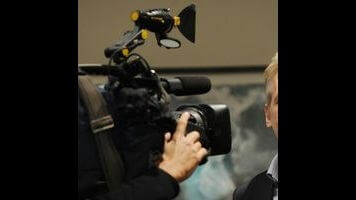Tonight’s first hour picks up where last week left off: inside the White House in the jittery months after the collapse of Lehman Brothers. Barack Obama’s decision to appoint Tim Geithner, as secretary of the Treasury, rather than the reform-minded elder statesman Paul Volcker, is explained as a kind of platonic bromance between two young men with a lot in common. (“It was love at first sight,” says Jackie Calmes of the New York Times.) Frontline frames the decision this way: In the wake of the global financial crisis, Obama could either reform Wall Street, or he could rebuild it.
As we all know, he opted to rebuild it, instead spending most of his political capital on health care reform. Obama’s decision is explained sympathetically. Despite calls from advisers like Larry Summers and Rahm Emanuel—hardly standard bearers for the proletariat—to “get some scalps” from Wall Street, Geithner was reluctant to do anything that would disturb the volatile markets. Obama, ever the pragmatist, agreed. The only problem was, once all the major banks passed Geithner’s stress test and paid back bailout money, they were essentially off the hook. The president had the bank CEOs over a barrel, and he let them go in order to quell the stock market. Frontline’s take on the Obama administration is extremely judicious, maybe even charitable. Geithner comes across as a cool-headed if short-sighted crisis manager, rather than a pawn of Wall Street, and Obama’s failure to punish America’s biggest banks is explained as a missed opportunity rather than a moral failing.
The line-up of interviews is impressive: Frontline producers have rounded up seemingly every reporter at The New York Times, along with a dozen or so others from places The Wall Street Journal and The New Yorker. Then there are the heavyweights of global finance, like Robert Reich and Christine LeGarde, and former administration officials Austan Goolsbee and Lee Sachs. It’s a regular hall of fame of policy wonks and economic experts, but there is a certain middle-of-the-road quality to a good deal of the commentary. For the sheer number of interviews included in the documentary, a bit more variety in point of view—both left and right—might have been useful.
In its final hour, Frontline examines the culture of Wall Street in the years since the crash, only to find that—wait for it, wait for it—not much has changed. It posits a direct link between the pervasive greed of the financial industry and still-unfolding economic crises in places as far-flung as Casino, Italy and Birmingham, Alabama. The problem, according to Frontline, is that the banking industry has strayed too dramatically from its “plain vanilla” roots—so far, in fact, that the relationship between banks and its customers has become an adversarial one. Bankers sell complicated financial products to unsophisticated consumers with the express purpose of ripping them off. Where’s George Bailey when you need him?
The most powerful testimonies in “Money, Power and Wall Street” come from a handful of young people disillusioned by their careers in finance. They’re introduced early in the fourth hour of the documentary, and their stories all have a similar arc. Young, bright, and accomplished, though not particularly venal, they were siphoned away from other careers by the plush Wall Street salaries. And, despite the nagging sense that some of what they were doing wasn’t entirely ethical, they each stuck around longer than they ever expected. One subject, Cathy O’Neil, worked at a hedge fund, where she used her considerable mathematical ability to predict when pension funds would buy or sell, so her firm could bet against them. “I felt like I was doing something immoral,” she says. Her fellow Wall Street exiles—all of whom are women, it’s probably worth noting—express similar reservations with their former line of work.
Only in the closing minutes of the documentary do we learn that these women have all become members of Occupy Wall Street’s alternate banking group, who now spend their days poring over the Volcker rule to find potential loopholes that other bankers could exploit. It’s a smart way of combating two stereotypes at once: The hygienically challenged, bongo-playing OWS misfit on one hand, and the cigar-chomping Wall Street fat cat on the other. O’Neil is hopeful that, with the sustained efforts of people like her, a more humane financial system is possible. “Not something perfect, something better than this,” she says. Let’s hope she’s right.


 Keep scrolling for more great stories.
Keep scrolling for more great stories.